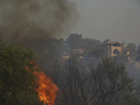Ukrainian forces are holding back Russia's concerted summer push to break through defenses along parts of the front line, Ukraine's President Volodymyr Zelensky says.
"They are not advancing. It's very tough for our guys out there. And it's tough everywhere," Zelensky told reporters on Thursday, in comments embargoed till Friday. "It's also very hard for the Russians — and that's good for us."
 Full Story
Full Story
Ceasefire talks between Hamas and Israel are expected to resume next week, a Hamas official said Friday, as Israeli strikes continue across Gaza and experts warn Palestinians are on the brink of famine.
Hamas official Bassem Naim said on Friday that he was told an Israeli delegation would depart for consultations early next week. Previous talks had been held in Qatar. His comments come a day after the United States recalled its negotiating team from Qatar and after President Donald Trump's special envoy, Steve Witkoff, said Hamas' latest response to the negotiations showed a "lack of desire" to reach a truce.
 Full Story
Full Story
Wall Street was on track to open with gains on Friday, adding to record highs ahead of next week's busy slate of earnings, job market reports and the tariff deadline.
Futures for the S&P 500 and the Dow Jones Industrial Average both were up 0.1% before the bell. Nasdaq futures were flat.
 Full Story
Full Story
Tens of thousands of people sought refuge on Friday as border fighting between Thailand and Cambodia entered a second day, heightening fears of a broader conflict.
The U.N. Security Council is scheduled to hold an emergency meeting on the crisis later Friday in New York, while Malaysia, which chairs a regional bloc that includes both countries, called for an end to hostilities and offered to mediate.
 Full Story
Full Story
France's highest court is ruling Friday on whether it can strip the head of state immunity of Bashar Assad, the former leader of Syria now in exile in Russia, because of the brutality of the evidence in accusations against him collected by Syrian activists and European prosecutors.
If the judges at the Cour de Cassation lift Assad's immunity, it could pave the way for his trial in absentia over the use of chemical weapons in Ghouta in 2013 and Douma in 2018, and set a precedent to allow the prosecution of other government leaders linked to atrocities, human rights activists and lawyers say.
 Full Story
Full Story
Before the eruption of sectarian violence in southern Syria, Saber Abou Ras taught medical sciences at a university in the city of Sweida and was somewhat hopeful of a better future for his country as it emerged from nearly 14 years of civil war.
Now, like many others in the Druze-majority city in southern Syria, he carries arms and refuses to give them up to the government. He sees little hope for the united Syria he recently thought was in reach.
 Full Story
Full Story
Iranian and European diplomats met Friday in Istanbul to embark on the latest drive to unpick the deadlock over Tehran's nuclear program.
Representatives from Britain, France and Germany, known as the E3 nations, gathered at the Iranian consulate building for the first talks since Iran's 12-day war with Israel in June, which involved U.S. bombers striking nuclear-related facilities.
 Full Story
Full Story
Aircraft from Lebanon, Jordan, Spain and Israel were on their way Thursday to help battle a huge wildfire in Cyprus that has claimed the lives of two people. Police were investigating reports that arsonists were to blame.
The flames have scorched more than 120 square kilometers (46 square miles) of forested hillsides in one of the worst such blazes in recent memory.
 Full Story
Full Story
Former President Joe Biden's son Hunter, seen by some as the problem child of the Democratic Party for legal and drug-related woes that brought negative attention to his father, is lashing out against Democratic "elites" and others over the way he says his father was treated during last year's presidential campaign.
Hunter Biden spoke publicly in recent interviews about last year's election, when Joe Biden ultimately dropped his bid and Donald Trump won the White House. In a three-hour, expletive-filled online interview with Andrew Callaghan of Channel 5, he directed ire toward actor and Democratic Party donor George Clooney for his decision to call on the elder Biden to abandon his 2024 reelection bid.
 Full Story
Full Story
Heavy storms in northern Vietnam left one person dead and another missing, police said Wednesday, as Wipha weakened from a tropical storm into a depression.
A 59-year-old man was killed in Nghe An province when a tree fell on his house on Sunday before the storm made landfall, police said. Nghe An, which stretches from the coast to the mountainous Laos border, was among the areas hit hardest by heavy rain and floods. Another woman was swept away by floodwaters and remains missing. Four other people were injured.
 Full Story
Full Story



